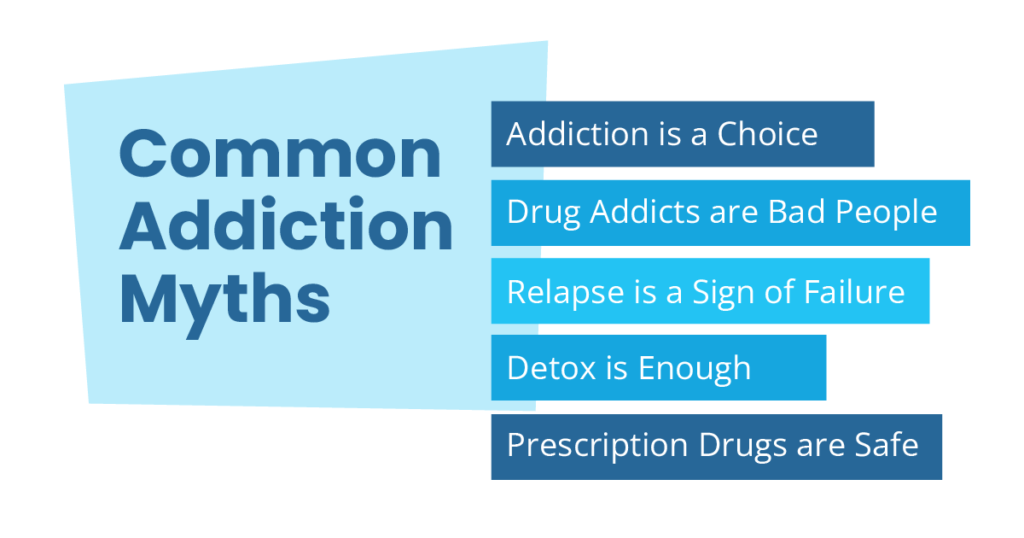
A myth is a false assumption or idea about something. Unfortunately, myths can be quite pervasive when it comes to addiction. Myths about alcohol and drug addiction are harmful to addicts, their families, and society as a whole. It is crucial to recognize addiction as a chronic disease and treat it accordingly.
These myths about drug and alcohol addiction must be addressed and acknowledged for what they are: false beliefs and ideas that demonize addicts and have a harmful impact on treatment and recovery.
Addiction is a Choice
One of the biggest misconceptions about addiction is that it is a choice. In fact, the world’s foremost experts on addiction concur that drug abuse is a chronic illness like cancer, diabetes, and heart disease. There are several reasons why someone could battle with addiction. Life events like trauma, mental illness, or genetics can be a factor, but occasionally they are not. Anyone may get addicted.
Once addiction has taken hold, the brain chemistry may change, making it challenging to control cravings. The drug develops into a desire and obsession that might precede other aspects of life. Therefore, addiction is not a choice. It is a disease.
Drug Addicts Are Bad People
Because addiction is a brain-born disease, it impacts behavior, memory, and motor abilities. Since the substance has altered the structure and function of the brain in different ways, the drugs or alcohol misused becomes the central focus of the addict’s existence. Due to the chemical alterations in their brains and therefore changed actions, they may lie, cheat, or steal to continue the habit.
Substance abuse does not discriminate and consequently penetrates our culture. Men and women, young and old, are all susceptible to developing a drug or alcohol addiction. Even good people may do bad things, therefore, the myth that only bad people suffer from addiction is simply a false belief.
Relapse is a Sign of Failure
Addiction is a disease like any other medical condition like diabetes or heart disease. According to studies, the relapse rates for common medical conditions like arthritis and hypertension are roughly equal to those for drug addiction.
Even though addiction cannot be cured like many chronic illnesses, it may be effectively controlled and treated with ongoing medical and therapeutic support. Those with addiction and diseases like diabetes must keep up with their doctor visits. Relapses in drug addiction and other chronic health diseases are inevitable on the road to recovery.
Prescription Drugs are Safe Drugs
Prescription drugs can be beneficial in treating pain and other ailments when administered under the supervision of a doctor. However, overuse of these medications can be harmful, especially among teenagers and young adults. According to research by the National Institute on Drug Abuse, 14 percent of young individuals aged 18 to 25 took prescription medicines for nonmedical purposes in the previous year.
Prescription medications that are often misused include ADHD meds, narcotic pain pills, and drugs designed to treat anxiety. Unfortunately, abusing these drugs may be fatal, with over five young adults dying daily from prescription drug overdoses. Prescription drugs have the same potential to be as addictive and deadly as illegal drugs.
Detox is Enough
Detox is the phase during which you work on eliminating all toxic substances from your system. This process can lead to unpleasant withdrawal symptoms. Detoxing at a rehab facility or an outpatient setting allows physicians to monitor your symptoms and intervene if required.
However, it does not end there. Getting sober is simply the beginning of the rehabilitation process. Maintaining sobriety is the next obstacle.
You Can’t Be Addict if You Hold a Job
Yet another societal stereotype, many people’s mental image of a drug addict is that of a dirty, unkempt beggar with no employment or life aspirations. Many addicts enjoy prosperous lives and carry on with daily activities. This type of high-functioning addict is an expert at concealing their addiction so that it goes unnoticed. It also is particularly harmful since it makes it more difficult for loved ones to intervene before it’s too late.
Frequently Asked Questions (FAQs)
What are the five theories of addiction?
Many addiction theories have been proposed in an attempt to discover the mechanism(s) that best explain the behaviors observed in addicts. These theories include:
– Negative Reinforcement-NR (“Pain Avoidance”)
– Positive Reinforcement-PR (“Pleasure Seeking”)
– Incentive Salience-IS (“Craving”)
– Stimulus-Response Learning-SRL (“Habits”)
– Inhibitory Control Dysfunction-IIC (“Impulsivity”)
What are the 4 levels of addiction in order?
Many factors can lead to alcohol and drug addiction, such as genetics, preexisting mental health conditions, environmental factors, and socioeconomic status. However, the professionals within the field of addiction agree that there are 4 levels of addiction, which are:
– Experimentation
– regular use
– High-risk use
– Addiction or dependency
What is the true cause of addiction?
It is commonly believed that the positive “reward” system that drug or alcohol usage provides is the primary reason people get addicted.
What is the biggest myth about addiction?
The biggest myth about addiction is that it can be ‘cured.’ Addictions are never cured. They are simply controlled. Under the right circumstances and with enough psychological pressure, the addictive behavior may and will recur. This is because chronic drug abuse leaves permanent imprints on the brain, causing it to become permanently hard-wired to anticipate stimuli.
Experience a Sober Life with The Haven
The myths surrounding addiction shed a poor light on treatment and recovery. Drug or alcohol addiction recovery is a dynamic and individual process. As a result, no two journeys are the same, and neither are their treatments.
We at The Haven Detox center know that beating a drug or alcohol addiction is challenging. We seek to motivate patients to confront their obstacles, accept their present state, and develop optimism for the future.
If you are anyone in your family members or friends is battling a drug or alcohol addiction, call us at (561) 328-8627 today!